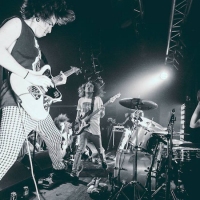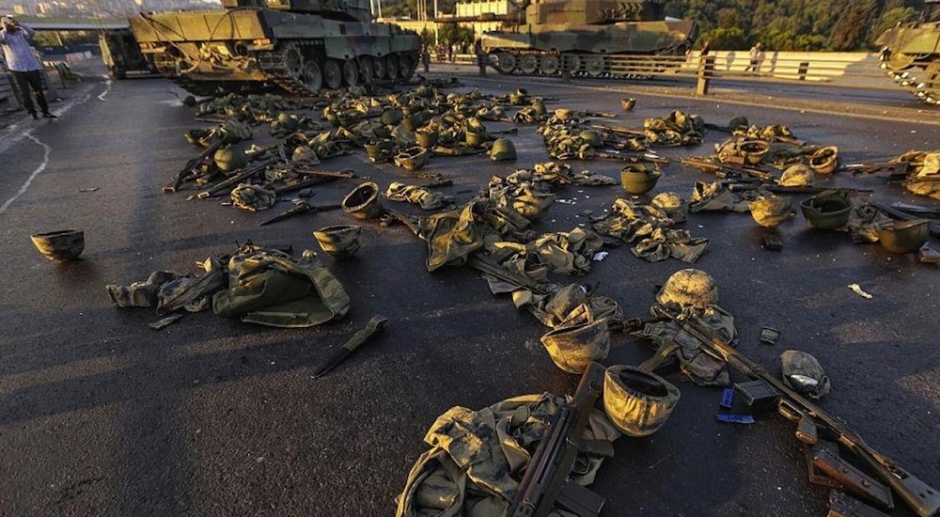 The (Over-Polished) Sound Of MusicMissing the days of recording fuck-ups and real instrumentation.
The (Over-Polished) Sound Of MusicMissing the days of recording fuck-ups and real instrumentation.

The News We Deserve
News doesn’t often inspire hope and optimism, but it doesn’t have to be this way.
Freshly dry-cleaned suits almost shimmer against the bright backlighting. Shiny, well kept hair sits atop a face strewn with neutrality and a certain ambiguity. The camera deepens the feeling of authority and prestige, as a woman’s voice with little tone or emotion is heard bringing life to the words on the mechanical teleprompter. For most of us, the news is very much ingrained in our daily rituals. We wake expecting to be greeted with stories from the other side of the world of terror, despair and helplessness. Sometimes these stories are scarily close to home.
There’s no doubting the benefits of being a well-informed citizen with an understanding of world events and current affairs, but do you ever get that feeling of crippling helplessness when you switch on the television or flick through the news app on your smartphone?
The stories we see on the news are a harsh and lived reality for someone, somewhere and there’s not much point in sugar coating that fact. But do we ever stop to ask ourselves, what good is this doing anyone?
Imagine, someone thrusts a hefty novel in your face and asks that you read a single sentence from the book. Once you have finished that sentence, the novel is taken away before being replaced with another sizeable work of fiction. Again, you read one sentence before the book is wrenched from your grip (If you’re not a book lover, replace the sentence with a thirty second grab of video and the books with unrelated TV series’ episodes). This process is repeated until you decide to stop.
In an interview with Richard Fidler on ABC Radio National (my favourite program ever) British philosopher Alain de Botton suggests this frustrating undertaking is very similar to the way most of us read the news. We are subject to a fleeting snapshot of a situation – say, the recent military coup in Turkey – and then expected to understand this incredibly brief snapshot in the wider context of the novel (let’s say Turkey’s political history and context for the last ten years).
Now, we’re kinda left with a few options about how to face the information presented to us, none of which are overly productive for anyone. Considering the event’s lack of proximity and relevance to our lives we could basically try to forget about it, which may be fair enough. Secondly, we could try and exercise some empathy, but given we only witness a thirty second window into a person's or people’s lives – civilians waving Turkish flags after the attempted coup, for example – it’s fairly hard to have a grasp on what these people’s lives are actually like day to day. If the news snippet happens to inspire us, we could decide we actually want to take action in respect to the wider circumstances of the event. But wait a second – has the mainstream news offered us any avenues to do so? Have these media outlets presented us the information in a way that promotes a sense of hope and optimism? In my experience, they probably haven’t. We as the young people of Australia have the ability to change this, to demand that news be presented in a different way.
The challenge that lies before us is to rethink the way news is delivered; the news we think we deserve, the type of news that will help the world to be a better place and not one that makes us feel like it’s tearing itself apart. It doesn’t have to be all about sunshine, rainbows and golden retriever puppies because that may not necessarily be our reality. Bad things do happen, and they happen quite often, but why can’t the news be something that gives us hope and guidance about how to change that? We don’t have to shy away from harsh realities that are lived by people the world over. We can acknowledge these people, and feel for them. And if we care enough, we can sit down and listen to a knowledgeable expert who can shed more light on the recent Turkish coup and its ramifications for the country, and then suggest some constructive and optimistic ideas about how we can (or, in some cases, cannot) help the situation. These kinds of approaches to presenting news do already exist, and I’ll talk about that a bit later, but these forms of media don’t seem to represent the majority of overall news coverage dispensed in this country – and interestingly, they aren’t often considered or given credit as real ‘news’.
Empathy certainly has a critical place in our lives but if we spent every hour of every day being totally empathetic to the plight of every suffering across the world, we’d be at best pretty miserable, or at worst; most likely undergo spontaneous combustion. Philosopher De Botton argues that in conjunction with expressing empathy, there are times in our lives where we really need to practice the exact opposite: to consciously allow ourselves to feel numb. The ubiquity of news through television, radio, print and, more recently, social media platforms means we are subject to a constant and seemingly infinite amount of news. It’s damn well overwhelming, to say the least. We scroll through Facebook or Twitter only to be subjected to wars, famine and murder in every corner. These are someone’s reality, as I said earlier, but they are not our own. For the sake of our sanity, there are those times when we must simply numb ourselves to all that is occurring around the planet in order to get on with our daily lives – as monotonous, menial and boring as they may occasionally seem. Numbing ourselves to the ills of the world does not make any of us bad people, and we shouldn’t feel guilty for ignoring everything – since when did guilt ever get us anywhere?
What is lacking from how our mainstream news is presented is humanity – the human side of devastating events across the world. To expose the humanity in a story doesn’t inherently assume it to be positive. Our humanity – the common thread that links every one of us – encompasses the good, the bad and the ugly. It shows our strengths but it also exposes our deepest flaws. The grim pictures of Syrian refugees drowning at sea do represent death and loss, but they don’t convey the unwavering strength and resilience of the millions of survivors who continue by choosing life and hope. The photos of the bullet riddled truck that mowed down crowds in Nice does portray the brutal nature of the act, but it doesn’t reflect the beauty shown by French people –Muslims and non-Muslims alike – banding together in the aftermath to show solidarity. The reports on remote Indigenous communities discuss alcoholism and incarceration, but they do not show the capacity and desire of a heavily oppressed people trying to maintain a strong link to the land and to a culture that has survived multiple ice ages. The mainstream news – either consciously or subconsciously – allows us to forget these facts. This is what needs to change and slowly but surely, it is.
We are starting to see the prevalence and success of alternate streams of news delivery. The pioneering success of This American Life showed the power of the podcast – a platform available to absolutely anyone, which has the ability to give voice to the otherwise voiceless in society. The Saturday Paper is a great example of long form journalism. This news platform focuses on giving a deeper perspective on select issues – and the public’s desire for this kind of news has been reflected in its apparent success in printed form. This news paradigm does not bombard us with constant streams of material but instead aims to untangle the complexities of a few problematic issues in our societies. There is an obvious need to be selective in their respective approaches, but these forms of news are much more likely to inspire hope and optimism, to promote change and resistance – even in the face of atrocities – than the plethora of information that swamps us on the six o'clock news. Obama himself touched on these issues in a speech at the White House Correspondent’s Dinner in April of last year:
“Investigative journalism, explanatory journalism, journalism that exposes corruption and justice and gives voice to the different and the marginalised, the voiceless — that’s power, that’s privilege. It’s as important to America’s trajectory, to our values, our ideals, as anything that we could do in elected office.”
In my recent experience, turning to alternate sources of news to get your daily dose of info is something worth a try. Cynicism is transformed into faith in other human beings, and bitterness gives way to trusting the good in the world. You won’t end up accruing a superficial understanding of everything that goes on across the globe, but you will be guaranteed a deeper understanding of something that truly matters to someone, and if you’re lucky you might be gifted a profound insight into something critical to the humanity in all of us. A face transformed into a wry smile by the spectacular ingenuity of a group of disadvantaged kids who’ve created a cool new initiative in their local neighbourhood. Tears glide slowly across cheekbones as an artist speaks of what it is to see war first hand, the listener left totally captivated and completely disarmed in that highly charged moment – as if the world is standing still. It is in these times, when raw human emotion is exposed, that people stand up and decide that things can be better.
 The (Over-Polished) Sound Of MusicMissing the days of recording fuck-ups and real instrumentation.
The (Over-Polished) Sound Of MusicMissing the days of recording fuck-ups and real instrumentation.
 My experiences living (and coping) with AnxietyWhat it's like having anxiety, and some start points on how to cope with it.
My experiences living (and coping) with AnxietyWhat it's like having anxiety, and some start points on how to cope with it.